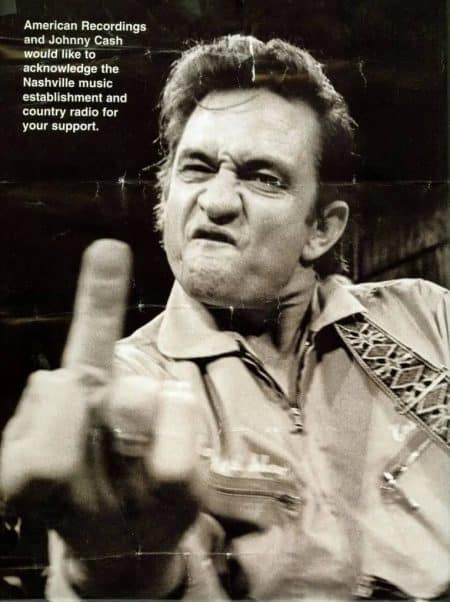Johnny Cash, An American Folk Hero’s Journey By Little Robert
Johnny Cash, known worldwide as “The Man in Black,” is an enduring symbol of American music and culture. His deep baritone voice and poignant storytelling encapsulated the American experience, marked by personal hardship, redemption, and an unwavering commitment to the marginalized. Cash’s journey from humble beginnings to becoming a revered figure in country music is a testament to his resilience and authenticity.
Early Life and Struggles
Born on February 26, 1932, in Kingsland, Arkansas, Johnny Cash grew up during the Great Depression. His family struggled financially, working as sharecroppers in the rural South. From a young age, Cash was exposed to the raw and rugged life that would later inspire much of his music. His childhood was marked by the tragic loss of his brother Jack, a traumatic event that haunted him throughout his life and often reflected in the sorrowful undertones of his songs.
Cash’s early experiences with gospel and folk music, combined with the hardship of his upbringing, laid the foundation for his future career. After serving in the Air Force, Cash moved to Memphis, Tennessee, where he began his musical journey. He signed with Sun Records in 1955, releasing hits like “Cry! Cry! Cry!” and “Folsom Prison Blues,” which showcased his unique sound and lyrical depth.
Johnny Cash, Marriage and Turbulence
Cash’s personal life was as tumultuous as his music was influential. His first marriage to Vivian Liberto ended in divorce due to his constant touring, substance abuse, and infidelity. Despite the turbulence, this period also saw some of Cash’s most iconic work, including the hit single “I Walk the Line,” which was a pledge of fidelity to Vivian.
His struggle with addiction escalated, leading to numerous run-ins with the law. Cash’s outlaw image was solidified during this time, culminating in his infamous arrest for smuggling amphetamines across the Mexican border in 1965. Despite these personal demons, his music resonated deeply with fans who saw him as a symbol of defiance and redemption.
A New Beginning with June Carter
Cash’s relationship with June Carter of the legendary Carter Family was the turning point in his life. June’s love and support were instrumental in helping Cash overcome his addiction. Their marriage in 1968 marked the beginning of a new chapter, both personally and professionally. Together, they produced several successful albums and toured extensively, with June often sharing the stage with Johnny.
Their collaboration resulted in timeless duets like “Jackson” and “It Ain’t Me, Babe,” showcasing their undeniable chemistry and mutual respect. June’s influence extended beyond their music, providing Cash with the stability and encouragement he needed to reclaim his life and career.
Career Challenges and Revival
Despite his revival, Cash faced professional challenges in the 1980s. After a string of less successful albums, he was dropped by Columbia Records in 1986, a move that many thought signaled the end of his career. However, Cash’s story was far from over.
In 1985, he joined forces with Willie Nelson, Waylon Jennings, and Kris Kristofferson to form The Highwaymen, a country supergroup that rejuvenated his career. Their debut album, “Highwayman,” was a commercial success, and the title track became an anthem for the outlaw country movement. The Highwaymen’s camaraderie and collective talent brought a fresh perspective to Cash’s music, proving his versatility and enduring appeal.
The Rick Rubin Era and American Recordings

The most significant resurgence in Cash’s career came in the 1990s when he began collaborating with producer Rick Rubin. Rubin, known for his work in hip-hop and rock, saw the raw potential in Cash’s music and sought to strip it down to its essence. This partnership resulted in the critically acclaimed “American Recordings” series, beginning with the self-titled album in 1994.
Recorded in Cash’s living room with just his guitar, “American Recordings” was a stark and powerful collection that showcased his voice and storytelling prowess. Songs like “Delia’s Gone” and covers of contemporary artists like Nine Inch Nails’ “Hurt” introduced Cash to a new generation of fans. The success of the American Recordings revitalized Cash’s career, earning him numerous awards and critical acclaim.
Legacy of an American Folk Hero
Johnny Cash’s legacy as an American folk hero is built on his profound ability to connect with people from all walks of life. His music, characterized by themes of love, loss, and redemption, remains timeless. Cash’s willingness to confront his demons publicly and his advocacy for the underprivileged cemented his status as a cultural icon.
In his later years, Cash continued to produce music that resonated deeply with audiences, even as his health declined. His final album, “American IV: The Man Comes Around,” was a poignant farewell that encapsulated his life’s journey.
Conclusion
Johnny Cash’s life and music embody the spirit of America: a blend of hardship and hope, struggle and triumph. He remains a figure of enduring influence, a testament to the power of authenticity and resilience in the face of adversity.

